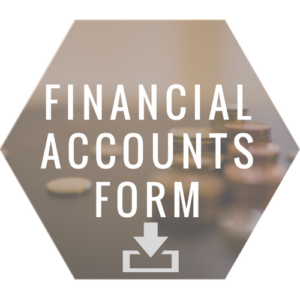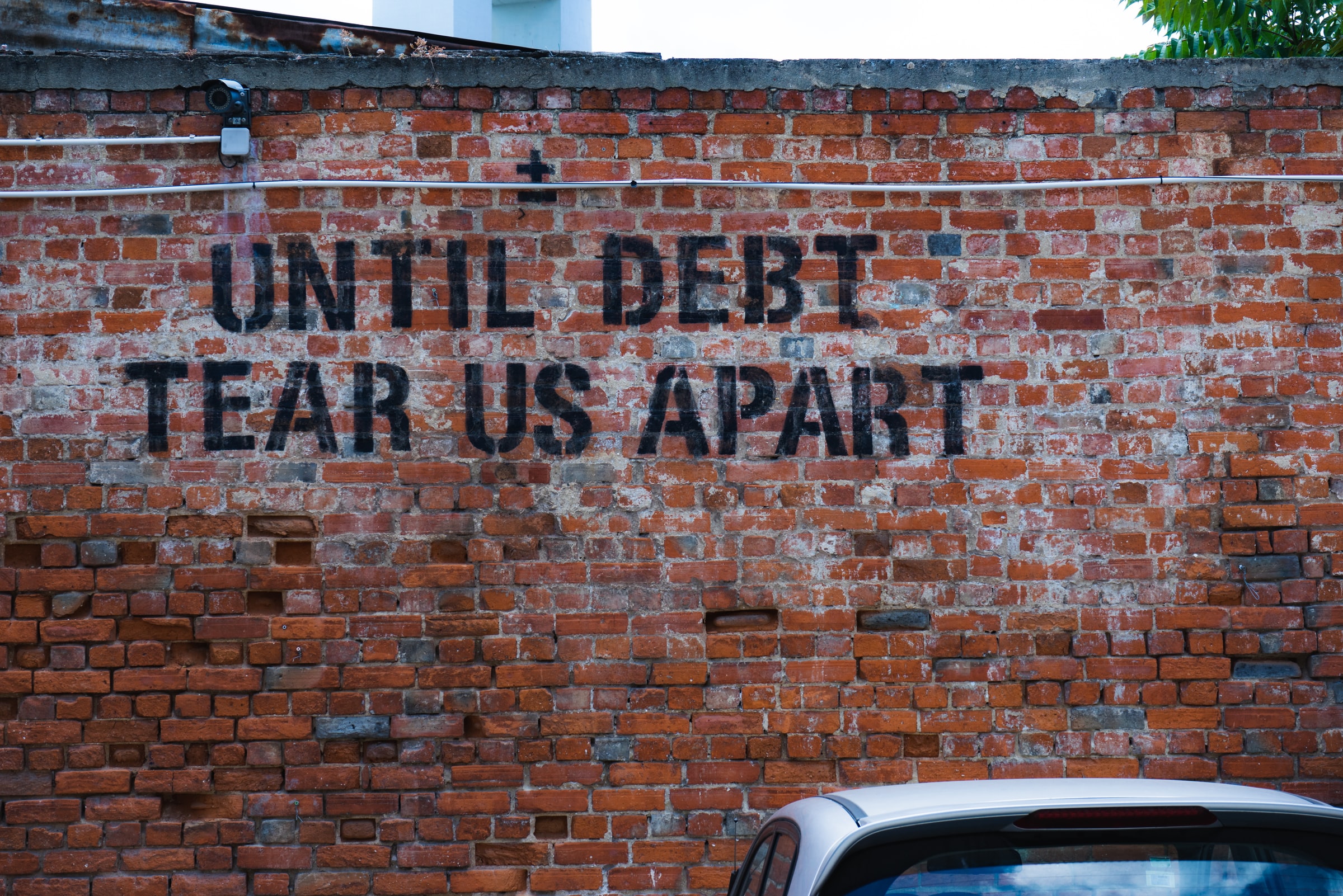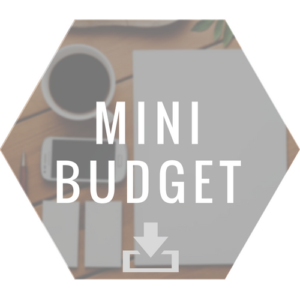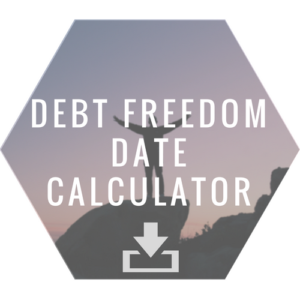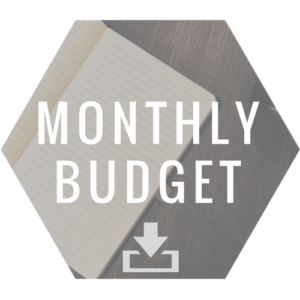Finance
Get Your Finances Organized!
It is extremely important to have your finances organized. In fact, I believe that lack of organization is one of the top reasons that people do not reach the peak of their financial potential. I am excited about this post, especially because we have a FREE tool to help!
Some of you may hear the word organize and your heart flutters with excitement, while others are probably filled with dread just by the sound of the word. Wherever you are on the spectrum, you can and NEED to get your finances organized. For your own sake, and for the sake of those you love.
Step One Understand why you are doing this in the first place
Let’s face it – we are all extremely busy. The last thing we need to do is initiate another paperwork process just for the sake of what “might” happen. I believe, however, that this process is an extremely valuable step toward maximizing one’s financial potential. If you take the time to complete the steps in this post, you will discover areas where your financial plan is lacking AND also where you are winning (which is very satisfying to see).
Here are some reasons to get organized financially:
- Control: It is hard for the finances to run out of control when you are focusing this intently on your financial affairs.
- Improved financial focus: We tend to improve that which we focus our attention on.
- We WILL die some day: Our family will appreciate a clearly organized set of financial affairs.
Organization and a great financial plan are two of the keys to the reason that Jenn and I have been able to experience financial freedom!
Step Two Prepare a list of all of your financial accounts
If you are a slightly, or very disorganized person (like I used to be!), this is probably going to be the most difficult part of the entire organizational process. It is important to gather together your financial statements so you can easily prepare a one or two page document that details your entire financial picture.
To speed up the process, we are PUMPED to provide a FREE TOOL for you to consolidate all of your information in one place – our Financial Accounts Form. You can download a copy from our Organizational Tools page on the IWB website.
Below is a sample of how the information can be written into the file.
Step Three Information to include on your Financial Accounts Form
This form is meant to be the be-all to end-all location for your entire financial picture. When you are looking for key financial information, you won’t have to go far because it is all contained within this file. When you pass away, it allows your estate executor to easily understand what they are dealing with.
Here are the key items to include in your Financial Accounts Form.
-
Investment Accounts
Include your 401(k), 403(b), 457, TSP, Roth IRA, IRA, stock, bond, and mutual fund investments.
-
Bank Accounts
Include checking, savings, money market, CDs, and any other accounts held at a bank or credit union.
-
Real Estate
If you own real estate, be sure to list the addresses and the financial status of these holdings.
-
Will
According to Bankrate.com, 58% of Americans do not have a written will. Have one, and include it’s location and your assigned executor on this document.
-
Power of Attorney
Healthcare POA, Limited POA, or other legal assignments of responsibility should be included in this document.
-
Insurance Policies
Include life insurance – be sure to include policies provided through your workplace. Also include insurance on key possessions owned.
-
Jewelry (or other valuables)
If you have valuable possessions, be sure to list them and their locations.
-
Safe Deposit Box
If you have one, indicate it on this document and include its location!
I know. I know. This can seem overwhelming, but it is absolutely worth the effort to put this together!
Step Four Make sure you are budgeting
Having your accounts listed out and your financial affairs in order is so important. What good does that do you though if you aren’t organized with the money that you spend?
Budgeting is another important step to making sure you are financially organized. If you haven’t started budgeting yet I suggest you check out my post “How Do I Budget?” It’s chalk full of tips on getting started along with free tools to make it easier for you.
Budgeting is part of being organized with the money that comes in and what goes out of your account each month. Taking control of this sets you up for financial success.
Step Five Where to Find Free or Cheap Resources
- Check your local hospital for free healthcare power of attorney forms.
For instance, our county hospital provides links to South Carolina’s free power of attorney form. Check your local hospital system’s website to see if they have the same available. They may also offer advanced directives. An advanced directives form takes the pressure off of your loved ones to make care decisions for you if you aren’t able to communicate your desires yourself.
- Some county library websites will also offer free legal forms, including those that are state specific.
- Several free legal documents (including power of attorney and a basic will) are located HERE
If you have substantial assets (including sizable term life insurance policies), I highly recommend that you meet with an attorney to have them review your documents to make sure everything is well organized and accurate. It may cost you up front, however it will give you peace of mind and save your loved ones in the long run.
Where else have you found great free (or cheap) legal documents?
Get Your Finances Organized!
Those Type A people reading this are probably chomping at the bit to get this done (if they haven’t already started). However, I know this may not be everyone’s idea of fun. Don’t delay though!
My hope is that as you’ve seen the benefits of having your finances organized it will keep you motivated to see it through. Getting organized may seem like a daunting task, but you should feel better equipped for it now.
As you organize your accounts and records not only will it help your loved ones in the long run, but it will become easier for you to understand your current financial position. This will help you as you make monthly decisions in your budget and set you up for success with your finances.
This may be a time consuming task your first go round, but after you have this set up it will be easy to update and maintain it going forward.
5 Ways to Save Money Without Selling Anything
When the economy takes a down turn, one of the best ways to “weather the storm” is to save money! In this post I will share the top five ways that we see people saving lots of money.
I believe that if you apply these five items, you will save over $1,000 a year. Don’t believe me? Try them out!
1. Home and auto insurance
I know that I have mentioned this several times on the blog, but it is so true! I have had HUNDREDS of stories of people telling me about how much money they have saved by getting new quotes.
Many of them never had to change their current insurer because they took the better quotes back to their current insurer and demanded a better deal. Sweet!
On our Next Steps Insurance page we have links to get both Auto and Homeowner’s insurance quotes. These allow you to fill in a bit of information and receive quotes without the hassle of having to call around to multiple different companies.
Remember when LendingTree said “When banks compete, you win!”? Well, the same is true for insurance companies. Be sure to get your home/renter’s insurance quoted along with your auto insurance because bundling them together will save you 10% – 30%.
2. Life insurance
It is incredible the number of people who have dependents reliant upon their income yet do not have life insurance. According to LIMRA only 59% of Americans have life insurance, and have of those with insurance have inadequate coverage.
As a teacher and speaker on the subject of personal finances, I have seen many examples of inadequate/no life insurance. The impact that it has on the surviving dependents is devastating. I have also seen instances where there was adequate insurance. The result is much different!
I have also seen a lot of people who are paying way too much on life insurance. Some people are paying thousands of dollars a year in life insurance premiums who tell me that the cash value will be worth $1,000,000 when they retire. I tell them that this is great, but if they would have term life insurance and invest the difference in cost, they would have $10,000,000.
I recommend term life insurance equal to eight to ten times one’s annual take-home pay. For healthy people term life insurance is SO CHEAP. I personally carry thirty year level term policies on my bride and me.
You can obtain online quotes without speaking to anyone HERE
Go ahead and check them out. If you do not have life insurance and you have dependents who are reliant upon your income, purchase a policy ASAP. If you already have life insurance, compare the costs.
My bet is that you will save a ton of money.
3. Zero-percent balance transfer credit cards
I do not know how the credit card industry has been so effective at teaching Americans to believe that 15% is a good interest rate. But they are great at it! I cannot tell you the number of times I have heard the following statement during a financial counseling appointment:
“The interest isn’t bad on this card. It is only 17%.” Or 13%. Or 11.99%. Or … You get the picture.
I used to say the same thing (when I was BROKE). I got “unBROKE” by challenging my belief system and realized that I was allowing myself to be legally robbed of my money!
If you are paying high interest on a credit card, you should seek to restructure that debt. One great way to restructure debt is to play the “surf the balance” game. Move the balance to a zero-percent balance transfer credit card and then work like crazy to pay it off. If it is not paid off by the end of the zero-percent period, surf it again. This ensures that all of your payment goes to reduce the principal balance of the debt.
There are several 0% Balance Transfer Credit Cards located on the “Next Steps” tab (HERE). Move the balance and make progress toward 100% debt freedom!
You will save a ton of money by restructuring high interest debt!
4. Online savings accounts
Do you have money in your savings account? If not, it should by your TOP PRIORITY. $1,000 as a minimum or $2,500 if you have kids or a house. I repeat – this should be your TOP PRIORITY!
For those with money in savings, how much interest is your bank paying you? If it is a local bank, it is likely that the interest rate is very, very, very low (close to 0%). Online banks pay much higher interest because they do not have to pay the costs of maintaining local branches (people, buildings, etc). These online banks pay around 5X – 8X the national savings interest rates of other banks. I hold all of my savings in online banks and have done so since 2007. They are FDIC-insured and are very easy to use.
There are several excellent online banks. Click HERE to see the online banks I use or recommend.
The bottom line is that your money should make you money – the most money possible. My online banks allow me to do that for all money that I plan on using within the next five years.
5. Groceries and cash envelopes
Cash envelopes allow me to save a TON of money. How? I have a written spending plan that my bride and I prepare every month. In this written plan there are several items that I tend to be impulsive with. Groceries, dining out, clothing, entertainment, and spending money are the top five impulsive categories for me (can I get a witness?). To control my impulsiveness, we pull that money out in cash. We stow away the debit card and only allow cash to be used to purchase items in our impulsive categories.
This one move saved us over $200 a month in groceries alone! You can read more about how to start with cash envelopes HERE.
You can also use coupons to save a ton on groceries. In fact, my team has prepared an entire section of money saving tips for groceries under the Next Steps budgeting tab. You can check it out HERE.
Our Top 5 Ways to Save Money
Saving money, especially a large amount of money, can seem impossible. Our hope is that after reading this blog post you come away with practical ways to save money NOW!
Some of these savings ideas will take some work. No one ever says, “I’d love to be on the phone with different insurance companies all day!” However, if it means saving $500 or more each year those phone calls are worth it. Not to mention, most companies now offer online quotes that eliminate the hassle of waiting on hold. We’ve heard from numerous people that after they called for new quotes not only are the saving money, but they’re also getting better coverage.
Decide to take action today. Think about the last time you got a new insurance quote. If you have balances on credit cards look into transferring them over. Move your savings to an online bank to earn more interest and save on banking fees. Identify areas where you overspend, and start using cash envelopes and coupons for those things.
I believe that by pursuing these five money saving areas you can save $1,000 or more. Tell us how you did!
You Can Be Debt-Free
I have found that a vast majority of those who sign up to attend the Financial Learning Experience are living paycheck-to-paycheck AND carrying debt. In fact, statistics from surveys I have conducted show that 72% of those attending my classes are living paycheck-to-paycheck. Of those 72% living paycheck-to-paycheck, 24% are BEHIND on payments.
Only 3% felt that they are doing well financially.
This is a NATIONAL problem. No matter where I go, I see the trappings of debt – marriages failing, stress, depression, and hopelessness. And all of this is happening in one of the wealthiest countries on the planet! This is entirely unacceptable!
So, as part of my crusade to help America become debt-free, I am going to share the process I followed to become debt-free.
Before I get started, I want to ask you these questions.
- Would you join me in my crusade?
- Would you share this with others?
- Would you commit to become debt-free?
I WANT YOU TO BECOME DEBT-FREE!!! It changes your life! It enables you accomplish far more than you ever thought possible with your personal finances! It allows you to go do exactly what you were put on earth to do – regardless of the income!
Step 1 – Understand WHY you want to be debt-free!
I believe this is the most important step in becoming debt-free! In the hundreds of financial counseling sessions I have held, it is amazing how many people do not have a plan for their lives.
I ask them, “Why do you want to win with your money?” and they stare at me like I am from outer-space.
“Why?” they stammer back at me.
Seriously, I believe that it is the first time that many of these people have ever seriously thought about what they want to accomplish with their lives. As a result, they are bumbling through life just “trying to make it through the day”.
What a miserable way to live!
I cannot overstate this fact – IF YOU AIM AT NOTHING, YOU WILL HIT IT EVERY SINGLE TIME!
Write out your hopes and dreams.
When Jenn and I wrote down our hopes and dreams on paper it opened our eyes to the fact that our money management (or lack of) was literally ROBBING us of our future! We wanted to move back to Anderson, SC to take a job that paid way less than what we were making, but every single dinner at Outback was robbing us of that opportunity. Every single debt payment went off to make the bank wealthy while at the same time robbing us of our God-given dreams!
That made me MAD! It made me FURIOUS! It made me realize how incredibly STUPID I was to be managing our money so crazily! I had $755 PER MONTH going out to pay car debt, credit card debt, and student loan debt. Add in the stupid house payment, and I had over $1,700 per month running off to make the bank wealthy!
By writing out our hopes/dreams on paper, Jenn and I were motivated to manage our money differently. It caused us to view debt differently.
Are you ready to get rid of your debt?
Take your first step today by print out THIS FORM and filling out your own hopes/dreams. If you are married, you need to do this separately and then take time to discuss it with each other.
By the way, one of my hopes/dreams is for you to become debt-free!
What has kept you from attacking your debt?
Step 2 – List your debts.
During financial counseling sessions, it is a guarantee for any person who has debt that I will calculate their debt freedom date. You should see people’s reactions as I put together a list of their debt! Their reactions relay to me the true facts of debt. Here are some very common reactions that I see or hear.
- Hiding their eyes
- “Oh no!”
- “I’ve never added it up.”
- “This is scary.”
- Moving to a defensive position as if to guard themselves against the debt
- Turn their head so they don’t have to look at the debt total
I KNOW that it can be scary to total up debt. The mere fact that it is so scary tells me two things:
1. People do not like debt.
2. People have not been paying attention to their finances and do not have a well-defined plan for their life. Otherwise, they would not have incurred most of the debt. It is literally ROBBING them of their financial future!
Here is what I say to them – “If you don’t know how many heads the dragon has or how large the dragon is, how can you effectively defeat it?”
It is time to slay the dragon. Use THIS FORM to prepare a well-organized list of your debt.
Why is it so scary to total up debt?
Step 3 – Calculate your debt-freedom date.
It is really very simple to calculate your Debt Freedom Date. You need two numbers to calculate your Debt Freedom Date – Total Debt Owed and Total Monthly Payments. I pretend that there is actually only one debt – with one big balance and one big monthly payment.
![]()
Look at the sample debt list below. This family will be debt-free in just 33 months!
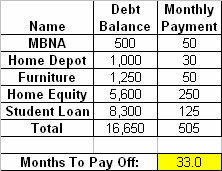
In the TOOLS section, there is a free tool called the Debt Freedom Date Calculator. If you enter your debts and monthly payments into this tool, it will calculate your Debt Freedom Date for you! If you don’t have Microsoft Excel, click HERE for a web-friendly version.
How many months until you are debt-free?
Step 4 – Establish accountability to become debt-free.
The strongest among us can still fall to temptation! You could be making fantastic progress toward debt-freedom and then a new truck pulling a new boat passes you on the road. If you are not careful, you will also be pulling a new truck and boat down the road!
There are two key ways to ensure you are held accountable to your goal of debt-freedom!
If married, work together with your spouse. If unmarried, have someone you trust (someone who has won with their money) hold you accountable!
There is incredible power when you work together with your spouse toward debt-freedom! It is a common goal that will unify your marriage and cements your commitment to managing your resources together.
I have also found that when I have a bad case of the “I Wants” and “I Gotta-Have” Jenn does not. She shuts me down! Then, when Jenn gets a bad case of “I Really Want This” I do not. I shut her down! Why? Because we are not doing debt! We are THROUGH with it!!!
Plan your spending every single month!
Planned money goes farther than unplanned money! Every single month Jenn and I sit down TOGETHER and spend every single dollar on paper before we are paid. Don’t miss that – that was good! Every. Dollar. On. Paper. BEFORE. We. Are. Paid.
From the day that Jenn and I started budgeting, we have not incurred any new debt. In fact, we became debt-free (minus the house) in just 14 months!
I can tell you this. I HATED the idea of budgeting and now all I do is yell from the mountaintops about how important it is and how EZ it is to budget! There are FREE budget forms that are available HERE. Use one of them to start your journey to debt freedom!
Your budget will hold you accountable. I wouldn’t be surprised if it helped you free up $200 – $500 per month to attack your debt even harder. It did for me!
If you’re already debt-free, how did accountability help you stick to your debt-freedom plan?
Step 5 – Secure your debt-freedom.
Save at least $1,000 before attacking your debt!
I have seen so many people calculate their Debt Freedom Date and get all fired up about attacking their debt. They sell everything and everyone in sight. They can’t shut up about getting out of debt. It is all they talk about with their spouse. They have even sold their Clay Aiken AND Celine Dion albums!
Everything goes great for two months. They smile every time I see them. “This is awesome”, they tell me enthusiastically.
Five months later, they avoid me. When I ask them what is up, they say something like, “Well, Johnny broke his arm and the emergency room bill and doctor bills cost me $1,500. I had no savings so now I am right back where I was – falling back into more debt.”
How demoralizing is it to attack debt so fervently and then have to go right back into debt? It is AWFUL! Don’t do that! Instead, save up at least $1,000 into an emergency fund before attacking your debt and THEN you can attack your debt all you want!
What happens if you have an emergency pop up while you are attacking your debt? You can use the emergency fund to cover the expense. To replenish the emergency fund, slow down on the debt pay-off plan until you have the $1,000 back in the emergency fund!
By the way, if you have a house, kids, or more than one car I highly recommend $2,500 for your emergency fund.
Secure your debt freedom plan with your emergency fund!
Congratulations! You now know the process that Jenn and I used to become and STAY debt-free! You are now equipped!
What are you going to do now that you are equipped to become debt-free?
You can be debt-free!
I want to equip you to become debt-free! Jenn and I became debt-free in 14 months by following this process, and I can tell you this – there is NOTHING like living life without the trappings of debt!
Let’s review the steps to debt freedom.
Step 1 – Understand WHY you want to become debt-free! You greatly improve your chances of becoming debt-free when you understand the reasons that you are making sacrifices in lifestyle!
Step 2 – List your debts. If you don’t know how large the giant is, it makes it really difficult to understand the overall situation!
Step 3 – Calculate your Debt Freedom Date. When you have put together your Debt Freedom Date calculation, print it out! Put it on the refrigerator! As you pay off each debt, draw a big line through it! You will not believe the conversation this will start with your family and friends as they come over to visit.
Step 4 – Establish Accountability. If married, hold each other accountable. If unmarried, have someone who has won with their own money and has your best interest in mind.
Step 5 – Secure Your Debt Freedom. Before attacking your debt save at least $1,000, or $2,500 if you’re married with children, so you have an emergency fund.
I hope that you have taken the time to write out your plans, hopes, and dreams for your life. Knowing these will help you stay the course. It will motivate you to say no now so you can win later!
What Should I Do With My Tax Refund?
What are you going to do with your tax refund?
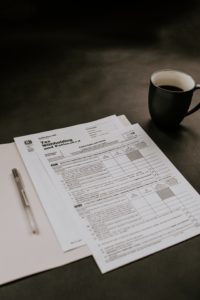 While tax season may seem like a distance memory to some, others may been filing today. 2020 has brought about a lot of changes, one of which was an extension for tax filing from April 15th to July 15th.
While tax season may seem like a distance memory to some, others may been filing today. 2020 has brought about a lot of changes, one of which was an extension for tax filing from April 15th to July 15th.
If you’re getting a refund what exactly should you do with this “extra” money this season? Save it? Pay off a debt or two? Invest it? Spend it? The possibilities might seem endless!
However, I would encourage you to plan out your refund BEFORE you ever get it.
STEP 1 Before You Spend It, Plan It
I used to have my tax refund spent sixteen different ways by the time it actually arrived. It was assigned to pay for Christmas, vacation, clothes, credit card bills, student loan payments, car payments, a new appliance, a new electronic device, etc.
In addition to having spent the refund sixteen different ways, I had already made all of the purchases via credit cards or other forms of loans.
When the refund actually arrived, it was woefully inadequate to cover all of my crazy spending.
Talk about feeling miserable! Is anyone reading this feeling my pain, or am I the only one who has done this?
When I decided once and for all to take control of my finances, I realized the root cause of my problem.
What was the root cause and the reason for all of my crazy spending?
I did not have a PLAN!
Before you spend your tax refund, plan out the spending! I highly recommend that you use the Mini-Budget Form (Excel) to plan your spending. Enter the amount of the tax refund at the top, and spend it to exactly zero. Remember: INCOME – OUTGO = EXACTLY ZERO™.
Start planning now – BUT don’t start spending just yet. We are still in the planning stages.
Next, we’ll cover where the money should go!
STEP 2 Build the Wall
Next, you need to build a wall of protection! When maximizing your tax refund, there are three categories that can help you build this wall:
(1) Save it, (2) Reduce Debt, (3) Invest it
When you’re trying to decide where to spend the money you get from a refund I typically refer back to the I Was Broke. Now I’m Not. Ladder. By identifying where you are on the ladder, you can pretty easily decide on the best way to spend your refund this year.
FIRST: Save It
One of the biggest reasons people fall off of the “I’m Going to Achieve Debt-Freedom” wagon is because they do not have any savings. Life is going to happen and it will cost money! If you do not have any savings you will remain broke.
Do you currently have money saved for emergencies or Known, Upcoming Non-Monthly Expenses (Christmas, vacation, property taxes, annual memberships, homeowner’s association fees)?
Before attacking debt or investing, you need to save money! Start with saving at least one months of expenses. How would it feel to have one month’s of expenses JUST SITTING THERE in your bank account?
I remember the day that this happened – and I did not have to mail it out to a creditor!!
If you do not have savings, use your tax refund to fill it up! Don’t have an account? Get great interest rates from these banks:
After you’ve established your emergency fund you should make sure to save for your Known, Upcoming Non-Monthly Expenses! These are expenses that we KNOW are going to happen.
Known, Upcoming Non-Monthly Expenses like Christmas, vacations, property taxes, building fund pledges, quarterly insurance premiums, annual health club membership fees, annual golf club dues, and homeowner’s association fees. If you have not saved for these expenses, they will completely derail your financial plan!
It is AWESOME to have money saved up in advance for vacation and Christmas!
SECOND: Reduce Debt
Don’t skip ahead to this step! Make sure you have savings first!
Too many people race past the previous option and use their $3,000 tax refund to pay off $3,000 of a $5,000 credit card. They have no Emergency Fund, they haven’t saved for Known, Upcoming Non-Monthly Expenses, and now they have just spent all of that money on a credit card.
Even if the $3,000 paid off the credit card, it is still not worth it if one does not any savings! Think about it this way. If the $3,000 credit card had a monthly payment of $100, how long will it take to get that $3,000 back into the bank? THIRTY MONTHS! Not worth it.
BUT, if you have taken care of the Emergency Fund and have saved for your Known, Upcoming Non-Monthly Expenses, it is time to attack the debt! Pull up the Debt Freedom Date Calculator (Excel) and calculate your own Debt Freedom Date! Make some debts leave your life!!
THIRD: Invest
If you have already saved money and reduced or eliminated your debt, your next step is to invest. Investments are the KEY to funding your big time plans, hopes and dreams! Investing is simply using your money and possessions to create more money and possessions. The goal for any investments is to gain more in return.
To learn more about the investments I’ve made this year check out the Monday Money Tip Podcast Episode #87.
STEP 3 Fulfill Some of Your Dreams!
Since the word FUN is in the middle of refund, make sure to have a little fun and fulfill some of your dreams!
Your tax refund could allow you to be generous and bless others, have a fun day with your family, or contribute to funding a dream.
What dreams do you have? What will it take to accomplish them?
Here are some good questions to ask yourself to fire up your dreams again:
- What opportunities do you want to provide to my children?
- What trips do I want to take?
- Who do I want to bless? What do I want to bless them with?
- What type of house do I want to live in?
- Where do I want to live?
- What career(s) do I want to pursue?
- When do I want to retire?
My passion is to teach you how to live a fully funded life so that money doesn’t keep you from living your dreams. In my book, 20/20 Money, I talk more in depth about how to make your dreams a reality.
STEP 4 Should You Even Receive a Tax Refund?
This one will be argued until the sun fizzles out, but here are my thoughts.
If you have proven to yourself that you can abide by your written budget every single month for several months, then you could consider increasing your W-4 exemptions so that you come close to breaking even at tax time.
Because you have demonstrated the ability to stick to your written plan, you will be able to take full advantage of your money instead of giving the government an interest-free loan all year long.
BUT, if you have NOT proven to yourself that you can follow a written budget, I would highly consider leaving your exemptions as is. Focus on getting your money management under control by planning your spending using a BUDGET FORM from the “TOOLS” page.
You should keep it the way it is until you have sufficiently proven to yourself that you are a good manager of money. Think about how horrible it would be to blow all of that extra money in each paycheck and then not even receive a tax refund check! Awful!
STEP 5 What Do I Do if I Owe Money?
Maybe you’re reading this, and thinking I wish that was me. I wish I was receiving a refund, but instead I’m going to owe money.
Many people who have delayed filing have probably done so knowing they are going to owe money. Some of you have already started to save money in preparation for this, but others may be wondering where or how you are going to come up with extra funds.
Check out Episode #83: Money Saving Tips and Episode #106: Buying and Selling Online of the Monday Money Tip Podcast if you need some ideas on how to save or earn some extra money for your tax payment.
Maximizing Your Tax Refund
As I shared before, I used to spend my tax refund sixteen different ways BEFORE I ever received it! What a miserable feeling it is to receive that great tax refund check and turn around and mail it out to creditors. Anyone identify with that feeling?
But, I also know what it is like to receive a great tax refund check and be able to KEEP IT ALL! What a great feeling! It is a reward for sound money management.
Why not make this year be THE YEAR that you take control of your finances?
Use this tax refund to make sure you’re on the right track financially. Stock up your emergency fund, pay off debt, and start funding your dreams. Whatever you decide to do, do it intentionally. Write up a plan, and allocate the money according to that plan.
For more tips about how to maximize your tax refund check out Episode #82 on the Monday Money Tip Podcast.
How Do I Stop Impulsive Spending?
Recently, I was teaching the Financial Learning Experience at my local church when I had a gentleman raise his hand and asked this question.
“How Do I Stop Being Impulsive?”
My answer? I don’t know to stop the impulsive nature, but I DO know how to control my impulse to spend recklessly.
I am a SPENDER. I am the type of person who would go out and accidentally buy a truck. I am a spender to my very core. I like buying things. You could say impulsive spending comes naturally to me. The best way I’ve found to combat my impulse to spend is being intentional about my finances.
Here are some steps I have taken that helped me reign in my impulsive spending nature, and it has allowed us to win financially!
A Written Spending Plan
 The first thing that helped me reign in my impulse to spend is putting together a written spending plan EVERY month BEFORE the month begins. Jenn and I continue to do this EVERY month BEFORE the month begins. Did you catch that? EVERY month.
The first thing that helped me reign in my impulse to spend is putting together a written spending plan EVERY month BEFORE the month begins. Jenn and I continue to do this EVERY month BEFORE the month begins. Did you catch that? EVERY month.
It reinforces the fact that we cannot flippantly spend our money and expect to succeed. When you have personally helped prepare the spending of your money on paper, you are much more aware about whether or not you can afford the “I WANT THAT!” item.
Having a written plan means that each month you have already told your money where to go on paper before the month even starts. Instead of wondering, “Can I afford this?” or thinking “Maybe it will be okay just this once,” you already know the answer. You know what you have allocated for each category, and if you spend impulsively how it will break the budget.
Jenn and I use the budget forms that are available on the TOOLS page of our website. If you want more information about how to start budgeting check out our post “How Do I Budget?” for tips on how to get started. Trust me, the word budget doesn’t have to send chills up your spine. I can, and it will help you win with you money!
Cash Envelopes
Like I said before, I am an impulsive spender, but even I will not impulsively spend money on the electric bill. I won’t impulsively purchase gasoline. I don’t impulsively send extra money to the cable company. There are some things that I am not going to impulsively spend money on.
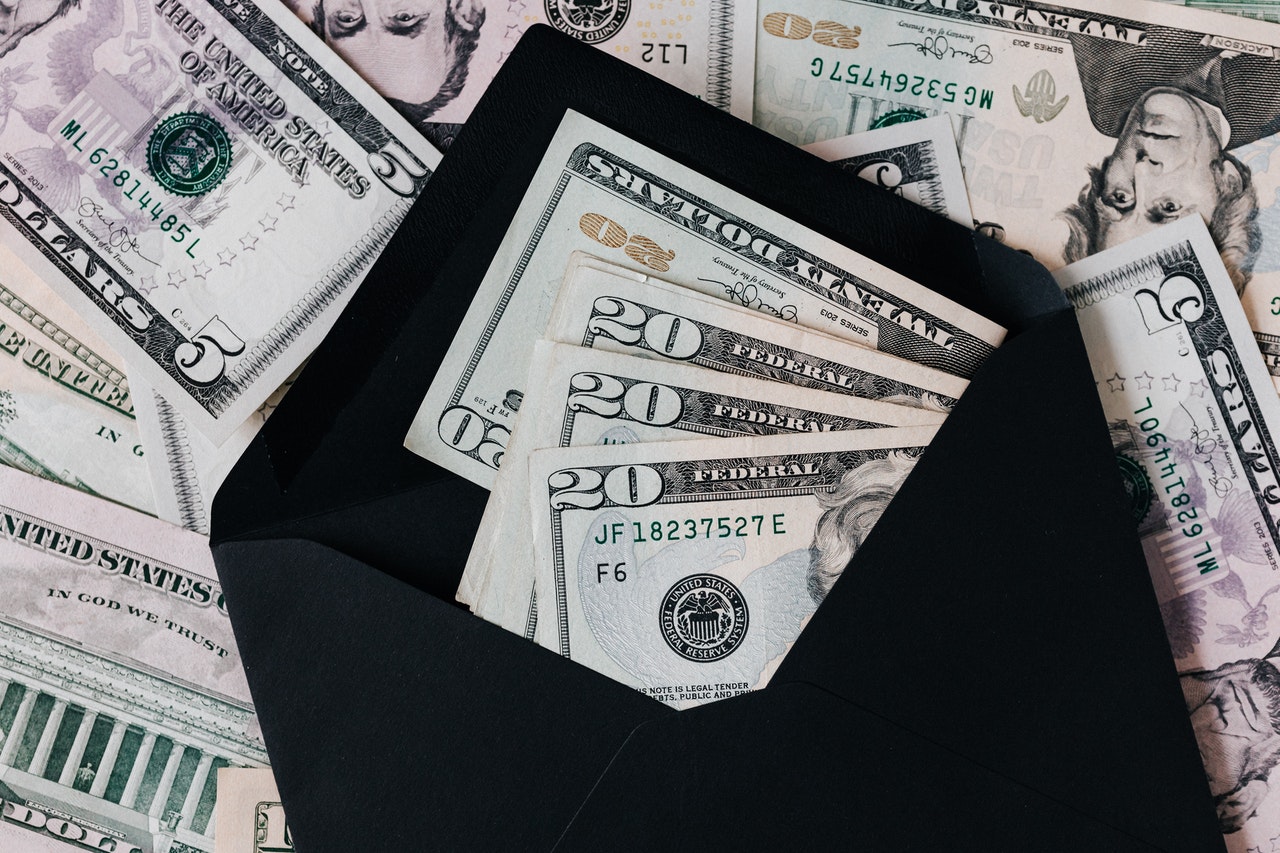 However, there are some things that I am VERY impulsive about. Items like groceries, dining out, clothes, spending money, and entertainment. I can go through some money really fast with these items! Since I know that I am impulsive for these spending categories, I use cash envelopes.
However, there are some things that I am VERY impulsive about. Items like groceries, dining out, clothes, spending money, and entertainment. I can go through some money really fast with these items! Since I know that I am impulsive for these spending categories, I use cash envelopes.
At the start of the month we add up the amount we have put in the budget for these categories. We then pull that amount out in CASH. The rule is that we can not pull more money out from the bank AND we can not use the ATM or debit card. I can not overspend cash.
To read more about why I LOVE cash envelopes check out this post.
Chop Up Credit Cards
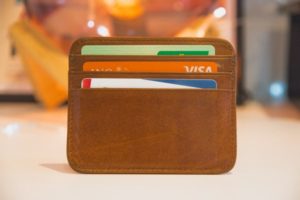 You may pay yours off every month, but the vast majority of Americans do not. I was part of the vast majority, and I had to admit that I was a completely loser with credit cards. I ran those stupid things up three different times. I was stupid with them. They really catered to my impulsive nature. So I did what had to be done and applied the scissor blades to them and shut the accounts down.
You may pay yours off every month, but the vast majority of Americans do not. I was part of the vast majority, and I had to admit that I was a completely loser with credit cards. I ran those stupid things up three different times. I was stupid with them. They really catered to my impulsive nature. So I did what had to be done and applied the scissor blades to them and shut the accounts down.
After years of not using credit cards I do have them again now. How do I keep myself in check? Well, I still don’t use them on things I am impulsive about. Can I use them to pay utility bills? Yes! Can I use them to book travel for work trips? Yes! Do I use them for my spending money that I have budgeted for each month? Absolutely NOT!
Many of you are like me – you need to kill the bad spending habits, and the only way to do that is to get rid of the card. If you are able to have them later on you have to make sure you have accountability in place – like a budget that you review with your spouse or not using them for things you are tempted to overspend on.
How do I eliminate the credit card debt I already have from impulsive spending?
Maybe you are thinking, “Joe, that sounds great, but I’ve already wracked up credit card debt.” If you have questions about how to pay off credit card debt check out our post “You Can Be Debt-Free.” You can also listen to our Monday Money Tip podcast episode on “0% Balance Transfer Credit Cards” or check out options of 0% balance transfer credit cards on our Next Steps page to see if they can help you eliminate your credit card debt.
If you are a fellow spender, what have you done to control your impulsive spending habits?
Let there be…TIME
Sometimes the best cure for the “I wants” is time. The moment we see it we want it, however if we wait to purchase sometimes the desire fads.
If today you see the shiny new motorcycle your neighbor just bought you may think “I want one.” Don’t run down the street to your local dealership and purchase it right away. If you wait a few weeks it will bring clarity. “That motorcycle is awesome, however I really would rather save up for a boat that my whole family can enjoy.”
The more time between the “I WANT THAT!” moment and the actual “Purchasing Decision” moment, the clearer the decision will be. Impulsivity can lead to buyers remorse, and a slue of unnecessary things filling your home that you really don’t need (or want for that matter).
Seek Advice
One of the best ways to stop impulsive spending is to seek guidance from someone you trust and wants to see you prosper. I’ve said this before and I’ll say it again (and again and again), find wise financial counsel. If you are married include your spouse.
Having someone else invested in seeing you succeed financially creates accountability and will encourage you along the way. It’s a lot easier to stay the course, and stop the impulsive spending when you know you are going to have to answer for the purchases you’ve made.
Stay The Course
We are ALL impulsive. It seems to be different things for each of us, but we all have a case of impulsiveness every now and then.
If you do get off course – make the rash purchase – don’t let it derail you. Tomorrow is a new day, and a new opportunity to make wise spending choices. Look at what lead to your impulse purchase, and think about ways to prevent something like that in the future.
I wonder if any of you out there would share some “near misses” where you almost made a horrible, snap-judgment financial decision but you did not. What helped you make the decision to back out? How does it feel now as you look back on the situation?

